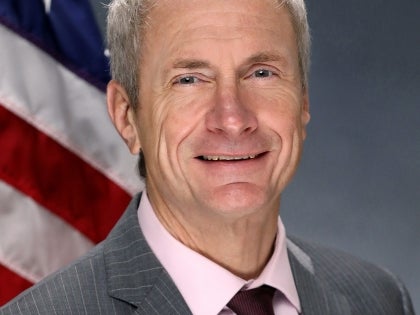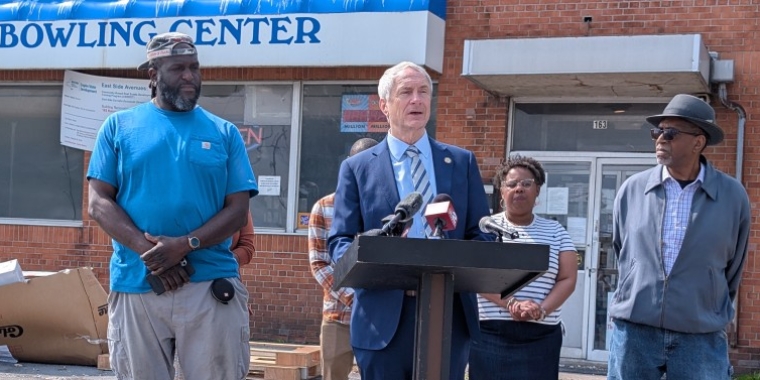
Gun legislation to be discussed in Albany? (WBEN Interview)

Audio:
https://omny.fm/shows/a-new-morning/gun-legislation-to-be-discussed-in-albany-state-se
Transcript:
Brian Mazurowski
Joining us live on the line, State Senator Sean Ryan to talk about possible new gun control measures as lawmakers return to their session in Albany. Sean, thanks for being with us this morning. How does this discussion begin and kick off? Because I'd imagine it's difficult to pinpoint something that will actually work, some sort of gun control measure that would work to solve the problem that we've seen here across the country in the last two weeks, and something that will get the support needed, and all kind of trying to do that at a time when there's an appetite for it. How does that work begin?
Senator Sean Ryan
Well, it all starts from a feeling of tremendous grief and pain, and all corners of New York State were looking at Buffalo. You know, just everyone shaking their head expressing grief for Buffalo, but also not wanting that to happen in their community next. So, it really comes from a very, very emotional and real place.
Susan Rose
Democrats hold supermajorities in both the Senate and Assembly. Is this going to be a heavy lift this weekend? And what specifically do you think we can expect to see?
Senator Sean Ryan
Just just like with the SAFE Act, these things happen in response to tragedies often. At that point, the Senate was held by Republicans and the Assembly was Democrat, and that was not a heavy lift for that tragedy. So, I think in response to this tragedy, you will see a few things. One is that we're most likely going to raise the age from 18 to 21 to buy a long gun. You see the killer in Buffalo, the killer in Texas more recently, turned 18 and went out and bought a military-style weapon right after. So, we'll hope to raise the age and help that, but we're also going to take a look at cracking down and regulating the sale of body armor. Who needs body armor if you're not in law enforcement or the protection business? The Buffalo shooter was kitted out head to toe in state-of-the-art body armor. In my opinion, that should not be readily available for sale in the marketplace like it is now. That should be sold under military license only.
Brian Mazurowski
I believe your proposal on them was to basically make -- whether it's a bulletproof vest or something like that, anything that could be considered body armor or fall under that umbrella -- to make that where you would have to purchase it in person? No longer over the internet? Is that kind of what you're going for here?
Senator Sean Ryan
Yeah, that's one approach. And most of the sales coming into New York State are internet sales. So, by banning internet sales, you're left with direct point of purchase. In many areas in New York State, there is no point of purchase for that. So, that would reduce a lot of body armor from the marketplace. And if you remember, the kid from Binghamton, he was able to buy these packages, get them shipped to his house in innocuous cartons. You know, I have two adult children in and out of my house, and you wouldn't believe the amount of packages coming through the house. So, this kid's parents had no idea what he was accruing. But forcing the face-to-face sale, people in the community then know what you're buying. It's out there. Just like we make face-to-face sales mandatory for liquor and cigarettes, pharmaceuticals, there's a reason for it.
Susan Rose
The face-to-face sales, then, would the clerk have to ask questions if someone were to buy it? And how many physical stores are there? Do you know?
Senator Sean Ryan
There's not that many physical stores. Most of these purchases are done through the internet; especially if you're trying to hide it. A lot of the stores that sell a police uniform, some of them will sell body armor. But those stores already have security systems in place, cameras in place, and they're used to dealing with law enforcement. So, if somebody non-law enforcement comes in, really, would raise some eyebrows. But eliminating the internet sale and the ability to impulsively purchase on the internet would go a long way. There's a separate bill that would ban the sales all together unless you're a member of law enforcement or law enforcement adjacent. So, we're going to take one of those bills, but right now we're trying to measure what would have the greatest impact.
Brian Mazurowski
Finding what would have the greatest impact -- how difficult is that and what does that conversation look like right now? Because, for example, New York already bans the sale of assault weapons to all civilians; it doesn't matter the age. But, you know, the definition of that, I guess it would depend on who you ask. There's a certain definition on certain features by law. But we know from what happened here in Buffalo, certain guns can be purchased and then, apparently, pretty easily modified to skirt around some of these regulations. How do you ensure that you're passing a law that is going to make an impact?
Senator Sean Ryan
Yeah, one thing we know for sure is there's not enough research done on gun crimes and mass shootings because, primarily, the federal government has banned research on this, if you would believe that. So we don't have a good body of research. A lot of professors have studied this and what we know for sure is there's no one single thing that is going to stop all the mass shootings in America -- that you have to take a a multi-faceted approach, and you have to be responsive, because these things spread. Most people who study these crimes, said that after Buffalo, within a week, there'll be another one. Lo and behold, not even a week and you have the shooting in Texas. But we also know, companies that make the AR-15, they are constantly re-engineering their product to conform with various state laws. But just to conform; just to make it under. So, the gun industry has been far from helpful in this. They're not an ally at all in this. They keep just trying to push their products into the widest number of households as possible. That's what we're left with now is, we know we have mental health problems. We know we have gun accessibility issues. But we spent $3 billion a year hardening schools, and that has not proven effective at all. A place like Tops spends money to have an armed security officer [and] other security measures, foiled by somebody who came in kitted out like they're in the Special Forces. What definitely doesn't work is the adage that a good guy with a gun stops a bad guy with a gun. That's not working in America. I just think we need to be nimble on this and to respond. And unfortunately, it's being left to state governments across America because the United States Congress and the Senate, they refuse to act. We can limit a magazine clip size in New York State; Pennsylvania stores set up stores on the border advertising clips to New Yorkers. So it's a real hodgepodge of laws, but we really wish the federal government would take up its rightful place and act on these things, and stop sending thoughts and prayers, but actually take some action.
Susan Rose
We are live with State Senator Sean Ryan this morning as the legislative session is coming to an end later this week and there are some gun control measures that the legislators will be voting on. Sean, Governor Hochul has called for tightening of red flag laws in the state. Is that something that can she can do with executive action? Or is that coming up before the legislature this week?
Senator Sean Ryan
The red flag law is on our menu of things to look at. When we first passed the red flag law, we kept it very narrow about who could report. Now we're looking at broadening that. We call that the extreme risk order of protection. Florida passed this after Parkland, by the way, with a Republican-controlled state government. So, we're looking at trying to update that to make it so other people can report the red flag considerations or thoughts to law enforcement. We think that's a tool.
Brian Mazurowski
Howard Safir, who was the police commissioner in New York City in the late '90s, said that it would be not a bad idea to basically treat a lot of these weapons, certain types of guns, as if they were -- I think they're categorized not as weapons of mass destruction, but you know, some of these weapons like a grenade, or a machine gun where, federally, you can actually technically own one of those but you have to have a special license, you have to submit photographs, almost as if you're applying for a passport, $200 tax, local law enforcement has to certify that a certain individual can own this weapon; there are a lot of different things in place before you can actually legally purchase one of these. Would that kind of fall under the umbrella, do you think, of common sense, where you can reach across the aisle and say, "we don't have to necessarily ban all this, but why wouldn't we just take every precaution to make sure that if somebody wants to buy this, they don't have bad intentions?"
Senator Sean Ryan
Doesn't that sound like a very commonsense, smart way to go about it? But, boy, do we run into people yelling about freedom, and sort of unfettered second amendment (rights). So, you know, we have to adopt things like you're speaking of. I mean, we have a similar system for handguns; in New York State, you have to go through a whole process. But then states like Virginia, Pennsylvania, and Ohio just willingly sell to people who bring guns up to New York State to sell them on the black market. So we, as a state, can only do so much. I mean, what you're describing is how the federal government got rid of machine guns from gangsters. At that time organized crime was using machine guns -- we've all seen the old gangster movies -- and that federal policy really eliminated the machine gun from from the United States of America. But, boy, has it been a long time since the federal government acted boldly in any way, shape, or manner about guns and safety.
Susan Rose
Sean, when can we expect the action this week, given that today's Tuesday? I'm assuming this is the day you're all arriving back in Albany.
Senator Sean Ryan
Yeah, we conferenced a lot of these issues over the weekend, so we're going to probably take these up on Wednesday and Thursday. The order of protection, the red flag that you spoke of, that allows only close relatives, law enforcement, and certain school officials to raise the red flag. We would like to broaden that so your employer and other people in the community who recognize you as being unstable and owning guns can raise the red flag, because we know with the Buffalo shooter, this kid had some problems. The problems were identified, but it did not prevent him from legally purchasing a weapon of mass destruction, his own AR-15.
Brian Mazurowski
Somewhat of a similar topic, want to ask you before we let you go, and that is the state of the east side of Buffalo. When we look at the aftermath of the shooting two weeks ago, and we hear about the term "food desert," and I think for a lot of people, it's hard to imagine that something like that could apply anywhere in Western New York, especially in the City of Buffalo. The idea of state involvement, and we heard this kicked around at one of the funerals over the weekend; would the state ever be interested in -- we see so many projects taken up, there's so much money spent on an idea like covering the 33, which is supposed to help an area of Buffalo. There's investment made into, you know, you can point at the Tesla facility; the state builds that looking to bring new jobs. Would the state ever be interested in building a facility and then saying to grocers, you name it -- Wegmans, Tops, Save A Lot, Aldi, whoever -- "Hey, if we build a facility here where we all know they desperately need it, would you be interested in coming in if we can help facilitate that?" Is that a good option for the state to spend money to improve the lives of New Yorkers?
Senator Sean Ryan
It's 100% a good option. The Tops on Niagara and the Tops on Jefferson were both built with government assistance to cut down on the food desert on the west side and the east side. But, certainly, more options are better. You see it every week: The local IDAs are giving massive subsidies to companies. The Town of Hamburg gave Amazon a multi-million dollar subsidy to build a warehouse. We should be doing the same thing for food deserts to make it so there are options for shopping. I mean, there's one supermarket in the whole community. I mean, just think about the areas up Elmwood Avenue -- you've got an Aldi, you've got a Tops, you've got Dash's -- you know, there are so many options. Then you go to the east side of Main Street, traditionally redlined areas, and you have so very little. I hope that one thing that comes out of this shooting is that we stop accepting, as a norm, that the east side is a under-resourced, under-invested, under-privileged area. Hopefully we can open the curtain on that and then fix it with some commonsense subsidies. A billion dollars for Elon Musk and Tesla -- let's make those sort of same investments directly into our community and alleviating some of the problems in our community.
Susan Rose
Senator, with that said, does that give any pause, then, to the covering of the 33 right now?
Senator Sean Ryan
I just don't view them as related. One is a transportation issue; it's going to take years to to happen. We have to do an environmental impact, we have to look at so many different things. So, we can definitely walk and chew gum. But we also have to acknowledge that we make these direct investments in other parts of the city and other parts of the state, but we somehow always leave entrenched, minority and poor areas behind. So, we need to sort of wake up and see the impact of our policies. You have heard for years the complaints coming from the east side, that the Buffalo Billion and the effects of the Buffalo Billion were not being felt in the communities of need. So, I hope that some of the the complaints that have come up over and over again over the years, that we will now -- with a new governor -- that we will start addressing these complaints. Because it's just something that we've taken as a norm, that we we keep an old redlined district intact, no longer by laws, but by how we -- I guess our tradition and our culture -- not investing in certain areas. We need to come together as a society to fix that.
Brian Mazurowski
Sean, thank you for the time. Sean Ryan, state senator joining us live this morning with a look ahead what might happen this week in Albany.
